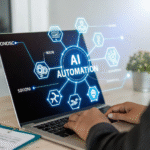Key Takeaways
- AI recruitment is transforming hiring processes: By streamlining operations, enhancing candidate experiences, and promoting fairness, AI is revolutionizing how organizations approach talent acquisition.
- Improved efficiency and speed: AI automates routine tasks like resume screening and interview scheduling, significantly reducing recruitment timelines and allowing recruiters to focus on strategic decisions.
- Fairer, bias-free hiring: By relying on objective data, AI helps mitigate unconscious bias, promoting diversity, equity, and inclusivity in hiring practices.
- Enhanced candidate experience: AI-driven tools personalize communication and interactions, offering tailored engagement and support for a more satisfying application journey.
- Consistent decision-making: AI ensures uniformity in evaluations, improving the quality of hire and eliminating disparities in candidate assessments.
- Adaptability in dynamic markets: Machine learning enables AI tools to evolve with changing job market trends, staying relevant and effective.
- Data-driven insights for smarter decisions: AI analytics provide actionable insights into talent pools, helping recruiters identify trends, predict hiring needs, and refine recruitment strategies.
AI-driven recruitment tools represent a sophisticated advancement in talent acquisition, optimizing processes while fostering inclusivity and enhancing the candidate experience. The sections below delve into practical applications, industry implications, and strategies for integrating AI into hiring processes.
Introduction
In today’s fast-paced job market, where finding top-tier talent can define a company’s success, the adoption of AI in recruitment has become a game-changer. By leveraging technologies such as machine learning and data analytics, AI empowers organizations to improve the hiring process—making it faster, fairer, and more precise.
The modern workforce increasingly values equitable hiring practices and strong candidate experiences. AI recruitment tools address these demands by automating mundane tasks, eliminating bias, and enabling a more engaging and personalized hiring journey. These tools are not merely improving efficiency; they are reshaping how companies compete for the best talent.
This article explores the pivotal role AI plays in transforming recruitment, from automation to data analytics, and provides actionable strategies for implementing AI-driven solutions that align with organizational goals.
The Role of AI in Automating Recruitment Processes
AI recruitment tools fundamentally enhance hiring efficiency by automating repetitive tasks and supporting strategic decision-making with advanced data insights.
Automating Routine Tasks
AI excels at streamlining manual, time-consuming tasks that often burden recruitment teams. For instance, resume screening—once a labor-intensive activity—is now managed by AI algorithms capable of analyzing thousands of applications to identify the most qualified candidates based on predefined criteria. Similarly, AI-powered tools handle tasks like interview scheduling, significantly reducing back-and-forth communication while ensuring timely coordination.
Enhancing Speed and Reducing Costs
This automation enables HR teams to expedite hiring processes, dramatically shortening the time-to-hire. By freeing recruiters from administrative burdens, AI reduces associated costs and redirects resources toward more strategic initiatives such as candidate engagement and improving organizational hiring strategies.
Enhancing Fairness and Reducing Bias in Recruitment
Unconscious bias in hiring has long been a challenge for organizations seeking to create diverse and inclusive workforces. AI recruitment tools offer a robust solution to this issue.
Mitigating Unconscious Bias
AI systems evaluate candidates based on objective, performance-related data rather than subjective human judgment. These neutral algorithms help ensure that hiring decisions are made fairly, free from biases involving gender, ethnicity, age, or other factors unrelated to professional competence.
Promoting Diversity and Inclusivity
Through unbiased assessments, AI tools actively contribute to fostering a diverse workforce. Research continually highlights the correlation between diversity and innovation, with inclusive teams outperforming their less diverse counterparts in creativity, problem-solving, and overall productivity. AI’s role in supporting equitable hiring underscores its strategic significance in modern recruitment.
Transforming Candidate Engagement and Experience with AI
Beyond addressing operational inefficiencies, AI enhances the candidate experience—an increasingly critical component of successful recruitment in competitive labor markets.
Personalized Communication and Support
AI-driven candidate engagement tools facilitate tailored communication. For example, AI systems adapt messaging based on individual profiles, while smart chatbots provide multilingual support, guide candidates through the process, and answer queries in real time. These tailored experiences demonstrate a company’s commitment to prospective employees, elevating employer branding.
Streamlined Application Processes
AI also simplifies complex application journeys by providing automated updates, progressing candidates efficiently through the recruitment funnel. With fewer touchpoints and real-time feedback, applicants enjoy a seamless process, leading to higher satisfaction levels and positive perceptions of the company.
The Strategic Benefits of AI in Recruitment
The transformative impact of AI extends far beyond the practical benefits of automation and fairness, providing strategic advantages that future-proof hiring processes for businesses.
Leveraging Data Analytics for Smarter Recruitment Decisions
AI-powered recruitment platforms generate key insights from vast datasets, empowering recruiters to make data-driven decisions. Tools can identify emerging talent trends, uncover skill gaps, and anticipate future workforce needs, helping companies proactively address challenges in a competitive job market.
Adapting to Evolving Market Needs
AI systems equipped with machine learning continuously refine their algorithms to keep pace with shifting industry demands. This adaptability ensures that recruitment tools remain relevant, catering to the dynamic nature of today’s job market. Whether the focus is on hiring for emerging tech roles or prioritizing soft skills in leadership positions, AI adjusts to evolving priorities.
Examples of AI-Driven Recruitment in Action
AI adoption spans a wide range of industries, with notable success stories showcasing its transformative potential.
Case Studies of Implementation
Within the healthcare industry, for example, AI recruitment systems have expedited the hiring process for critical positions. By automating candidate screening and scheduling interviews, healthcare providers have ensured swift onboarding for vital roles, improving patient outcomes. Similarly, in technology, companies use AI tools to precisely match candidates to specialized positions, increasing retention and boosting job satisfaction.
Across Multiple Sectors
Beyond healthcare and technology, industries such as retail and finance have also embraced AI-driven recruitment to address sector-specific challenges, such as optimizing seasonal hiring or mitigating hiring risks in high-turnover roles. These tools offer scalable solutions, allowing businesses to meet operational demands with agility.
Strategies for Integrating AI into Your Recruitment Process
Implementing AI recruitment tools requires a deliberate strategy and an ethical framework to fully realize their potential.
Selecting the Right Tools
Organizations should carefully assess their recruitment needs, budget constraints, and existing HR technology infrastructure when evaluating AI solutions. Many AI platforms allow for flexible customization, enabling businesses to start small and scale as needs evolve.
Training and Mitigating Ethical Concerns
To maximize AI’s value, HR teams must receive thorough training on effectively using these tools. Companies should also take proactive measures to address ethical considerations, such as avoiding algorithmic bias and safeguarding candidate data privacy—key components of responsible AI implementation.
Building a Comprehensive Implementation Strategy
An effective integration plan involves coordinating AI systems with existing recruitment workflows, conducting periodic performance reviews, and iterating based on results. Businesses that approach AI deployment methodically can optimize hiring outcomes and stay ahead of competitors.
Conclusion
AI-driven recruitment technology represents a paradigm shift in how companies acquire talent. From automating repetitive tasks and reducing unconscious biases to enhancing the candidate journey and enabling data-driven decision-making, AI offers transformative advantages that align with modern business needs.
For organizations, the key to success lies in adopting AI strategically. By prioritizing ethical implementation, investing in team training, and aligning AI tools with organizational goals, businesses can harness this technology to maximize hiring efficiency, foster diversity, and create a more inclusive future of work.
As AI continues to evolve, its influence on recruitment will only deepen. The opportunity is clear: organizations that embrace AI today will set the stage for not just hiring effectively, but defining the workforce of tomorrow. The question for businesses is no longer whether AI belongs in recruitment—but how to best leverage its potential to secure a competitive advantage.




